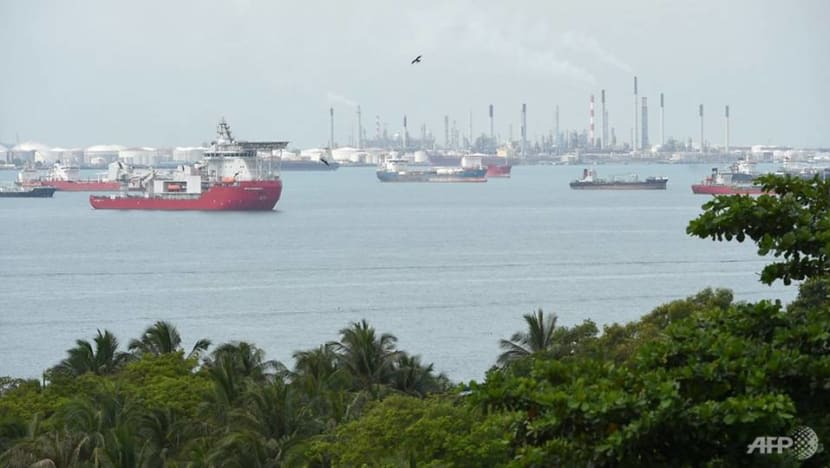Singapore forms maritime advisory panel amid 'dark clouds' of Ukraine crisis

Maritime vessels seen anchored on the waters south of Singapore. (File photo: AFP/Roslan Rahman)
SINGAPORE: A maritime advisory panel has been formed by the Ministry of Transport (MOT) and the Maritime and Port Authority (MPA) to seek global perspectives on key trends that will shape the industry amid the “dark clouds” of Russia’s invasion of Ukraine.
The Maritime International Advisory Panel will discuss how the maritime sector and other industries can collaborate to "enhance the resilience and connectivity of the global maritime industry and supply chains", said the authorities on Monday (Apr 4).
The panel comprises 12 cross-sector global business leaders with "diverse perspectives on key trends shaping the maritime industry", said Transport Minister S Iswaran in a speech at the opening ceremony of the Singapore Maritime Week.
UKRAINE CRISIS
Deputy Prime Minister Heng Swee Keat also gave a speech at the opening ceremony of the Singapore Maritime Week.
"Just as we were hoping to exit the storm with the receding of the Omicron wave, another one struck – the Russian invasion of Ukraine," he said.
He warned that the Ukraine crisis will "put the brakes on global recovery". Oil prices are at an all-time high, adding pressure to global inflation and increasing the risk of stagflation.
The crisis has led to the closure of civil airspace over Ukraine, causing some flights to be cancelled while those still operating take longer routes. Companies are also avoiding the China-Europe rail lines that run through Russia.
“The reduced air and rail cargo capacity, and the resulting higher costs have put a greater strain on shipping,” Mr Heng said.
Shipping has also been disrupted as more than 100 ships are stuck in ports in the Black Sea, with several damaged due to the conflict, he added.
“With Russia and Ukraine accounting for 15 per cent of the global seafaring workforce, there could potentially be manpower disruptions to the maritime sector,” he said.
“Even if military action in Ukraine ceases, the invasion has irreversibly accelerated the tectonic shifts in geopolitics.”
OUTLOOK FOR INDUSTRY “GOOD” DESPITE UNCERTAINTY
However, the fundamentals of the shipping industry “remain strong”, Mr Heng said. Global trade hit a record high in 2021 with more than 80 per cent of the trade volume carried by sea, he said.
“Despite the current uncertainty, the medium-term outlook for the global maritime industry is good,” said Mr Heng. "But to realise this potential, we must deal with the challenges and opportunities."
Global container shipping rates increased more than four times in 2021, compared to pre-pandemic levels.
On the other hand, the reliability of vessels arriving at ports on time more than halved to about 35 per cent last year, from around 78 per cent before the pandemic.
“This is partly due to the disruptions to manpower and logistics brought on by COVID-19, and lower investment in capacities in the down-cycle years,” said Mr Heng.
"But stripping away the cyclical and COVID-19 effects, the statistic also shines the spotlight on the potential for us to significantly improve the efficiency of entire supply chains, and capacity to adapt to evolving circumstances."
GREEN SHIPPING CORRIDORS
In his speech, Mr Iswaran announced that Singapore will join the Clydebank Declaration for Green Shipping Corridors, together with 22 other signatory states.
The Clydebank Declaration aims to support the establishment zero-emission maritime routes between two or more ports known as green shipping corridors. At least six such corridors are expected to be established by the middle of the decade.
Mr Iswaran said: “Looking ahead, decarbonisation is a major challenge for the maritime industry. And we must act - today and together. As a global maritime hub, Singapore seeks to contribute to this critical effort in a flexible and inclusive way.”
The Transport Minister added that decarbonisation must be a “whole-of-industry effort”.
“Efforts at the company and industry level are just as important as government-led efforts,” he said, adding that Singapore welcomes industry-led collaborations to leverage its maritime hub ecosystem to pilot and deploy green solutions.
INNOVATION
Mr Heng on Monday also announced the launch of the “refreshed” Sea Transport Sector Industry Transformation Map for 2025, which sets out the collective course for the next few years, with an emphasis on innovation, human capital development and resilience.
The map was first launched in 2018 to bring stakeholders in the maritime industry together as part of a nationwide economic transformation effort.
The refreshed map includes developing Tuas Port into the world’s largest fully automated container terminal when it is completed in the 2040s. The port will deploy equipment such as automated double-trolley electric quay cranes and driverless automated guided vehicles.
Continuous innovation will be key to attaining new heights in performance and capabilities, said Mr Iswaran.
“To succeed in the transformation of the maritime sector, w believe we must focus on the essential elements of continuous innovation, boundaryless collaboration and strong talent development,” Mr Iswaran added.
"This endeavour requires partnership across countries, and certainly between the public and private sectors."
















